13 EASY AND PROVEN TIPS TO RELIEVE YOUR ANXIETY
13 EASY AND PROVEN TIPS TO RELIEVE YOUR ANXIETY
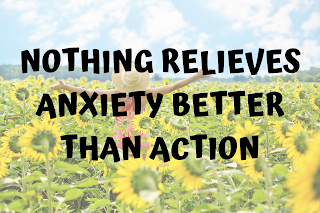 |
| RELIEVE ANXIETY QUOTE |
Anxiety disorders are
among the most common mental health conditions in the world. While it is normal
to get nervous about an important event or life change, numerous people live
with an anxiety disorder, which is more than the occasional worry.
For those with an anxiety disorder,
it’s important to look into strategies that can help manage or reduce anxiety
in the long term, like talk therapy or medication. But everyone can benefit
from other ways to reduce stress and anxiety with lifestyle changes such as
eating a well-balanced diet, limiting alcohol and caffeine, and taking time for
yourself.
Here are 13 tips and tricks which can help you relieve
anxiety:
1. ACCEPT AND ANALYZE
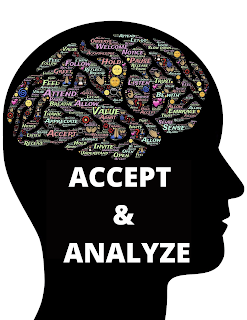 |
| ACCEPT AND ANALYZE |
You need to realize that anxiety is very common, and
can be successfully managed. But the very first step for that is to accept your
anxiety. And although it may require hard work on your part, motivate yourself
and never give up.
Write down all the things which precipitate or
aggravate your anxiety. Note down in detail how you feel then, and which things
seem to pacify you during that period. Expressive writing, or writing about
difficult emotions that you have about your life or a specific situation, has
been found to be beneficial in a wide range of studies.
2. THE TRIPLE 3 TRICK
 |
| DICE CUBE WITH 3 |
Look around you and name three things you see. Then,
name three sounds you hear. Finally, move three parts of your body -- your
ankle, fingers, or arm.
Whenever you feel like having an anxiety or panic
attack, this simple mental trick can help center your mind, bringing you back
to the present moment and calm you down.
3. BREATHE !!
 |
| BREATHE |
Mental
stress activates your sympathetic nervous system, signaling your body to go
into “fight-or-flight” mode. During this reaction, stress hormones are released
and you experience physical symptoms such as a faster heartbeat, quicker
breathing and constricted blood vessels. Deep breathing exercises can help
activate your parasympathetic nervous system, which controls the relaxation
response.
Deep breathing helps you calm down. Sit with your eyes
closed and turn your attention to your breathing. Concentrate on your
breath and forget everything else. Resist the temptation to follow the
different thoughts as they arise, and focus on the sensation of the breath.
4. EXERCISE
 |
| JOGGING |
Exercise is one of the most important things you
can do to combat stress. It might seem contradictory, but putting physical
stress on your body through exercise can relieve mental stress. Try to get a
few minutes of cardio exercises regularly, every day. Activities — such as
walking or jogging — that involve repetitive movements of large muscle groups
can be particularly stress relieving.
Exercise is nature's anti-anxiety remedy. Besides
clearing the mind, firing up the endorphins, and helping you sleep soundly at
night, researchers have found that individuals who exercise vigorously and
regularly were 25 percent less likely to develop an anxiety disorder within
five years.
5. MEDITATE
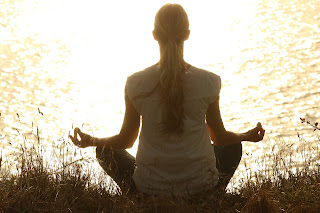 |
| MEDITATION |
Mindfulness is a
popular form of meditation. Mindfulness encourages a person to focus on
feelings, thoughts, or bodily sensations that are happening in the present
moment. It can help combat the anxiety-inducing effects of negative thinking.
Similarly, yoga has
become a popular method of stress relief and exercise among all age groups. Yoga
primarily does this by increasing body and breath awareness. It may help lower
cortisol levels, blood pressure and heart rate and increase gamma-aminobutyric
acid (GABA), a neurotransmitter that is lowered in mood disorders.
6. SLEEP AND SELF CARE
 |
| SLEEP LIKE A BABY |
Sleep helps you mentally as well as physically. All of
us need 6-8 hours of sleep daily to stay healthy and stress-free. Take adequate
rest. Proper sleep not only relieves anxiety and promotes mental well-being, it
also boosts your immune system and improves creativity.
If you’re sleeping less than 6 hours a night, you’re
probably looking at a prime cause of your anxiety. True, anxiety can make it
hard to sleep, but if there’s any way you can get 6-8 hours of sleep a night,
you would notice an immediate difference in your mood.
Pamper
yourself. Get a haircut, buy new outfits for yourself, get a massage, or new
shoes.
7. LISTEN TO MUSIC
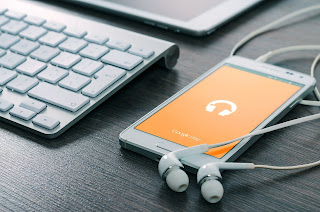 |
| LISTEN TO MUSIC |
Listening to music can have a very
relaxing effect on the body.
Slow-paced instrumental music can
induce the relaxation response by helping lower blood pressure and heart rate
as well as stress hormones.
Music
may activate reward systems in the brain that increase feelings of pleasure and
alleviate stress and anxiety.
8. PLAN A TRIP
 |
| VACATION |
An outing is always good. It calms your mind. When you
spend time in nature, you give your mind and body a much-needed break from
the routine stressful environment.
Irrespective of
the area you live in, you can always find a place around you which can be serene
and. You can also take a vacation and plan trips to visit places which you have
been postponing for too long.
9. REDUCE CAFFEINE INTAKE
 |
| REDUCE COFFEE INTAKE |
Caffeine causes
a spike in adrenaline levels, and this can make some people feel anxious or on
edge. Caffeine also can trigger panic or anxiety attacks, especially if you
have an anxiety disorder. Coffee is one of the most popular sources of
caffeine. Even decaffeinated coffee contains around 2–12
milligrams of caffeine.
Although many studies show
that coffee can be healthy in moderation, it’s not for everyone. In
general, less than five cups per day is considered a moderate amount.
10. ENGAGE
WITH FRIENDS AND FAMILY
 |
| FRIENDS AND FAMILY |
Being in
touch with your loved ones is the best antedote. Keep interacting with your
friends. Tell your family what is bothering you. Don't just keep things to
yourself.
They share
your problems, support you, motivate you, guide you. Do not assume that they
would be aware of your situation because they see you around daily.
Being part of a friend network gives you a sense of
belonging and self-worth, which can be really helpful to you in tough
times.
11. WATCH
COMEDY VIDEOS
 |
| COMEDY MINION |
Try watching a funny TV show or stand-up
comedy acts or funny clips from a movie or simply hanging out with friends who
make you
laugh.
Research shows
that laughter has lots of benefits for our mental health and well-being; one
study found that humour could help lower anxiety as much as (or even more than)
exercise can.
12. CUDDLE
 |
| CUDDLE THERAPY |
Positive physical contact can help release oxytocin
and lower cortisol. This can help lower blood pressure and heart rate,
both of which are physical symptoms of stress. Cuddling, kissing, hugging - all are beneficial.
You can have a pet for that too. Cuddling or
spending time with your pet also helps in reducing stress by promoting positive
mood and keeping you active
.
13. SEEK
MEDICAL HELP
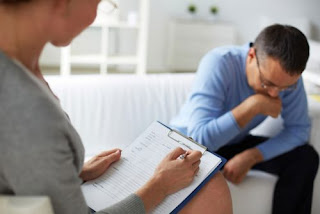 |
| PSYCHOTHERAPY |
Talk to a psychiatrist. There is a multitude of psychotherapeutic methods as well as medications available which your psychiatrist might consider for you based on your specific situation after your assessment. These are very helpful.
If it is
purely psychological, expert counseling treatments such
as Cognitive Behavioral Therapy can be extremely helpful.
However, you
will need to be in proper follow up so that he may assess your progress and
make necessary modifications in your treatment modality as and when required.
Some possible treatment options are listed
below:
TALKING THERAPIES
Talking therapy involves talking to a mental
health professional in a one-to-one capacity or as part of wider group
sessions. Some common talking therapies for anxiety include:
Counseling
Counseling is a short term therapy option typically
lasting several weeks. The goal of the counselor is to help people develop
strategies for managing stressful situations.
Some people use the terms counseling and
psychotherapy interchangeably, but there are some subtle differences.
Psychotherapy
Like counseling, psychotherapy aims to help people
regulate their emotions and improve their stress management skills.
However, psychotherapy tends to be a relatively long
term therapy that may cover a broader range of mental health issues. In some
cases, psychotherapy can be shorter term.
Cognitive behavioral therapy
Cognitive behavioral therapy (CBT) helps people
recognize how negative thought patterns can influence their mood and behaviour.
For example, a person who is anxious about attending
a social event may have thoughts such as “nobody will talk to me.” The thought
itself may intensify the anxiety, and the outcome may be that the person avoids
the event altogether.
CBT helps people replace these negative thoughts and
habits with positive and constructive ones. Over time, this can lead to reduced
anxiety.
MEDICATION
Sometimes, a doctor may prescribe anti-anxiety
medication alongside talking therapies. Some common anti-anxiety
medications include:
Buspirone
Although its exact mechanism of action remains
unknown, many believe that Buspirone works
by binding to certain serotonin receptors, thus enhancing the
activity of this neurotransmitter. This can lift a person’s mood and decrease
any feelings of anxiety.
Benzodiazepines
Benzodiazepines are sedatives, meaning that they
slow brain and body functions. They help alleviate anxiety symptoms, aid sleep,
and promote recovery from stress.
There has been a trend to decrease prescriptions of
benzodiazepines due to the risk of addiction. People who have had drug or
alcohol use disorders in the past are more likely to experience addiction to
benzodiazepines.
Beta-blockers
Beta-blockers work by blocking the action of
adrenaline, reducing effects such as rapid heart rate, which people tend to
experience when they are anxious.
CONCLUSION:
With
all the ups and downs of life, there is some amount of stress and anxiety, more
or less in everyone’s life. Many tips and
techniques can help people reduce their stress levels and promote calmness.
These tips often involve getting your mind away from the source of stress.
Moreover,
anxiety in itself can lead to depression also. Read How to Overcome Depression: 9 Steps
The key
to making the actions above work is consistency. You're the expert on your
life. Choose the ones that work best for you.
These are just a few tips. Help yourself and/or others in need you know. Do share more ideas with me in comments so that more people can benefit from your knowledge and experience.
These are just a few tips. Help yourself and/or others in need you know. Do share more ideas with me in comments so that more people can benefit from your knowledge and experience.
STAY HEALTHY. STAY HAPPY.
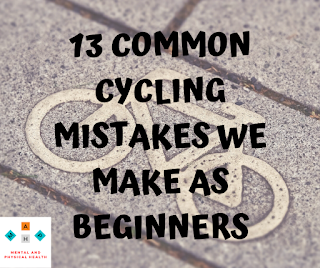

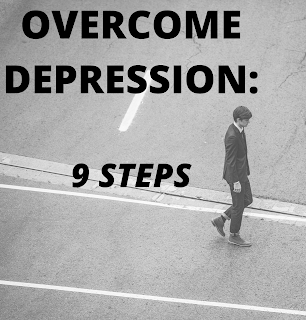
Comments
Post a Comment